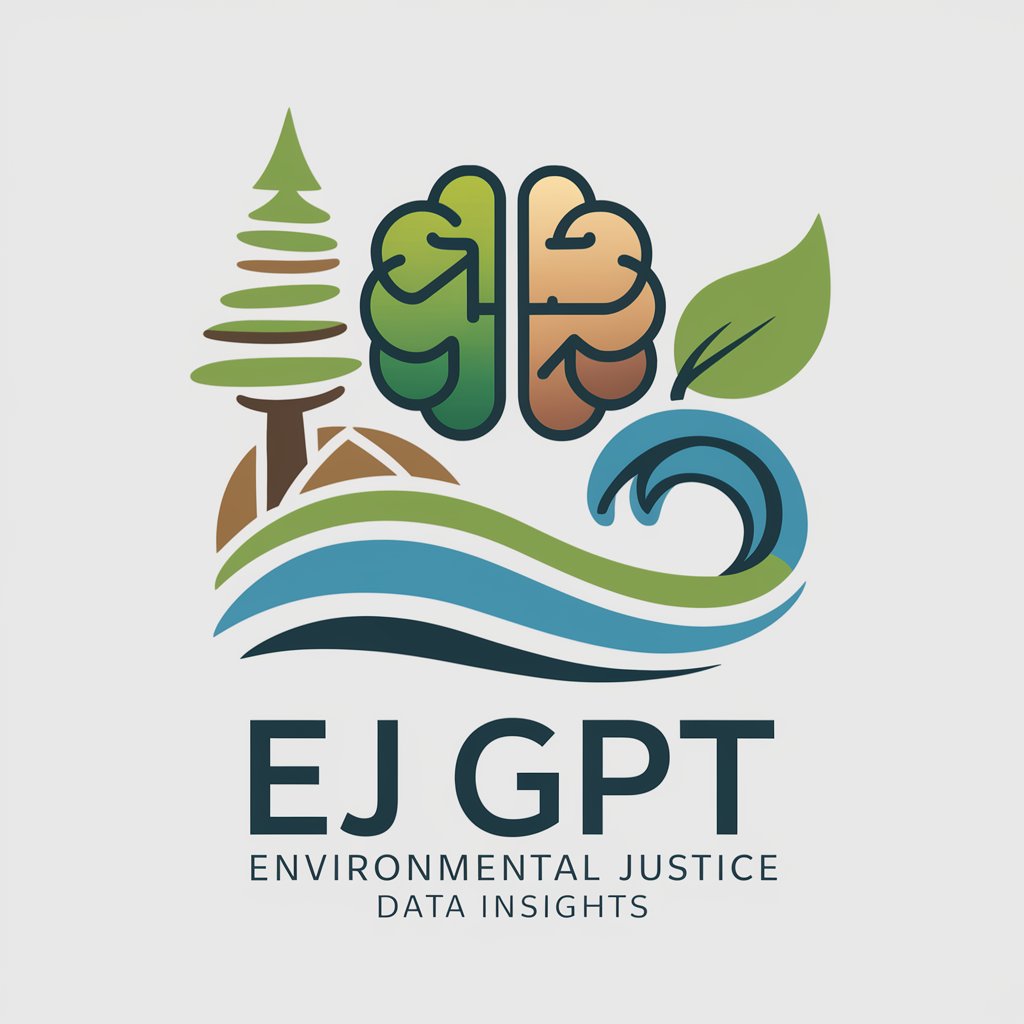EJ GPT - Environmental Justice Insights

Welcome! Let's dive into environmental justice data insights.
Empowering Environmental Justice with AI
Analyze the correlation between pollution levels and health outcomes in...
Identify the most affected communities by environmental hazards in...
Generate a report on the impact of industrial waste on local ecosystems in...
Explore the demographic patterns in areas with high environmental risks in...
Get Embed Code
EJ GPT: A Comprehensive Guide
EJ GPT, or Environmental Justice GPT, is a specialized model designed to provide insights and analysis focused on environmental justice issues. It leverages data from various sources to offer a nuanced understanding of how environmental policies, practices, and impacts intersect with social and economic factors across different communities. EJ GPT's purpose is to support research, policy-making, and advocacy by unpacking the complex layers of environmental justice, which includes but is not limited to, exposure to pollutants, access to green spaces, and the socio-economic dimensions of environmental decision-making. For example, EJ GPT can analyze data to identify communities disproportionately affected by air pollution, providing a detailed breakdown of the demographics, health implications, and potential policy interventions. This functionality enables a deeper understanding of environmental inequalities, aiding in the development of more equitable and effective environmental policies. Powered by ChatGPT-4o。

Core Functions of EJ GPT
Data Analysis and Interpretation
Example
Analyzing environmental data to identify patterns of inequality
Scenario
EJ GPT can sift through extensive datasets to highlight areas with high levels of industrial pollution and correlate these findings with health outcomes in local populations. This analysis is crucial for researchers studying the impacts of environmental disparities and for policymakers looking to target interventions in the most affected areas.
Policy Recommendation and Advocacy Support
Example
Offering insights for more effective environmental justice policies
Scenario
By evaluating the effectiveness of existing policies and comparing them across different regions, EJ GPT can provide recommendations for policy improvements. For instance, it might suggest enhancements to air quality regulations in communities living near coal-fired power plants, backed by data-driven evidence of the potential health benefits.
Educational Resource
Example
Serving as an informative tool for learning about environmental justice issues
Scenario
EJ GPT can generate detailed reports and explanations on environmental justice topics, tailored for educational purposes. This makes it an invaluable resource for teachers, students, and the general public interested in understanding the intricacies of environmental justice, such as the historical context of pollution in low-income communities and the strategies for community mobilization and advocacy.
Who Benefits from EJ GPT?
Researchers and Academics
Individuals engaged in environmental studies, public health, urban planning, and related fields will find EJ GPT a powerful tool for conducting data-driven research, supporting their investigations into the effects of environmental policies and practices on different populations.
Policymakers and Government Officials
Those involved in crafting and implementing environmental policies can utilize EJ GPT's insights to ensure their decisions are informed by comprehensive data analyses, helping to address environmental injustices and improve community health outcomes effectively.
Environmental Advocates and Community Organizers
Activists and community leaders working to promote environmental justice and mobilize local action will benefit from EJ GPT's ability to provide detailed, accessible information on environmental issues, enhancing their campaigns with evidence-based arguments and strategies.

How to Use EJ GPT
Start Your Trial
Begin by accessing a free trial at yeschat.ai, no sign-up or ChatGPT Plus subscription required.
Define Your Query
Clearly articulate your environmental justice-related question or the data insight you're seeking.
Utilize Advanced Features
Take advantage of EJ GPT's specialized datasets and analytical tools by specifying your needs in the query.
Interact and Refine
Engage in an interactive dialogue, refining your queries based on the responses to get the most precise information.
Apply Insights
Use the insights and data provided to inform your research, policy-making, or advocacy in environmental justice.
Try other advanced and practical GPTs
Hackathon Mentor
Empowering Hackathons with AI Expertise

Be Encouraged!
Empowering Conversations, AI-Enhanced

ADHDaptable
Empowering Minds with AI-Driven ADHD Support

Pro Artist
Transforming Text into Visual Art

Conspiracy Carl
Dive into whimsy with AI-powered humor

Playlist Pioneer
Craft Your Soundtrack with AI

Python Quant
Empowering Financial Analysis with AI-Powered Python

Drupal Coder
AI-Powered Drupal Development Expert

Michigan Football GPT
AI-powered Michigan Football Insights

Dating Profile GPT
Elevate Your Love Life with AI-Powered Profiles

Create My Avatar
Craft Your Digital Identity with AI

課題/レポートフィニッシャー
Empowering Your Writing with AI Innovation

Frequently Asked Questions about EJ GPT
What makes EJ GPT unique in handling environmental justice queries?
EJ GPT specializes in environmental justice, offering in-depth insights and data analysis powered by specialized datasets, ensuring responses are tailored to the nuances of EJ research and advocacy.
Can EJ GPT assist in academic research on environmental justice?
Absolutely, EJ GPT is designed to provide data-driven insights, references, and analysis that are invaluable for academic research, including literature reviews, data interpretation, and hypothesis testing in the realm of environmental justice.
How does EJ GPT ensure the relevance and accuracy of its data?
EJ GPT is built upon curated datasets and knowledge bases specifically focused on environmental justice, updated to reflect the latest research and trends in the field to ensure data relevance and accuracy.
Can non-experts use EJ GPT effectively for understanding environmental justice issues?
Yes, EJ GPT is designed to be user-friendly, providing explanations, insights, and data in an accessible manner, making it a valuable tool for both experts and those new to environmental justice.
Does EJ GPT offer predictive analytics for environmental justice scenarios?
EJ GPT can analyze trends and data to offer insights into potential future scenarios within environmental justice, aiding in predictive analysis and strategic planning.
